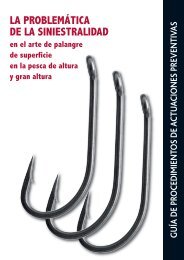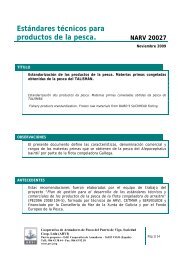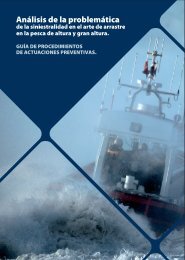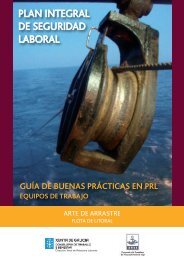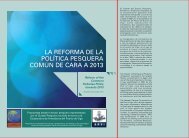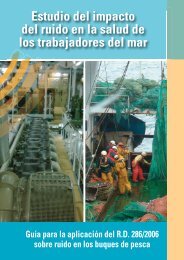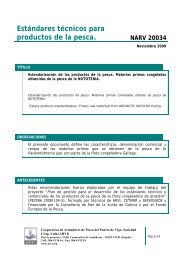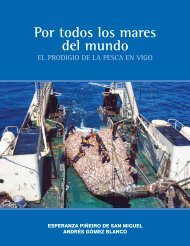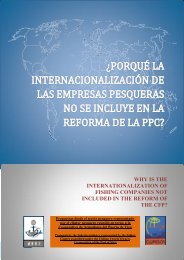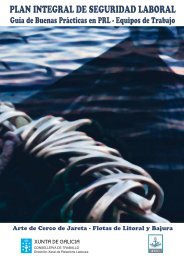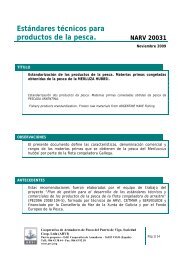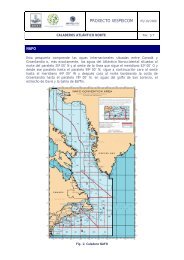RAZONES QUE JUSTIFICAN UNA REFORMA DE LA PPC ... - Arvi
RAZONES QUE JUSTIFICAN UNA REFORMA DE LA PPC ... - Arvi
RAZONES QUE JUSTIFICAN UNA REFORMA DE LA PPC ... - Arvi
Create successful ePaper yourself
Turn your PDF publications into a flip-book with our unique Google optimized e-Paper software.
Propuestas REASONS desde el THAT sector JUSTIY pesquero A representado REFORM OF THE CFP<br />
OTHER por THAN el clúster THOSE pesquero PROPOSED reunido en torno BY THE a la COMMISSION<br />
Cooperativa de Armadores del Puerto de Vigo<br />
Proposals by the fisheries industry represented by the fishing<br />
Cluster assembled under the Fishing Vessels’Owners<br />
Co-operative of the Port of Vigo<br />
1
<strong>RAZONES</strong> <strong>QUE</strong> <strong>JUSTIFICAN</strong> <strong>UNA</strong> <strong>REFORMA</strong> <strong>DE</strong> <strong>LA</strong> <strong>PPC</strong><br />
DISTINTA A <strong>LA</strong> P<strong>LA</strong>NTEADA POR <strong>LA</strong> COMISIÓN<br />
REASON THAT JUSTIFY A REFORM OF THE CFP OTHER THAN THOSE<br />
PROPOSED BY THE COMMISSION<br />
MARZO/MARCH 2012<br />
Cooperativa De Armadores De Pesca Del Puerto De Vigo, S. Coop. Ltda.<br />
Cluster del Sector Pesquero Extractivo y Productor<br />
Puerto Pesquero, Edificio Ramiro Gordejuela. Apdo. 1078. 36202 Vigo (España)<br />
Telef.: +34 986433844 / Fax: +34 986439218 / E mail: arvi@arvi.org Web: www.arvi.org<br />
2
Cooperativa de Armadores de Pesca<br />
del Puerto de Vigo, S. Coop. Gallega<br />
Cluster del Sector Pesquero<br />
Extractivo y Productor<br />
Puerto Pesquero, Edificio Ramiro Gordejuela. Apdo. 1078. 36202 Vigo<br />
Telef.: + 34 986433844 / Fax: +34 986439218 / E-mail: arvi@arvi.org<br />
<strong>RAZONES</strong> <strong>QUE</strong> <strong>JUSTIFICAN</strong> <strong>UNA</strong> <strong>REFORMA</strong> <strong>DE</strong> <strong>LA</strong> <strong>PPC</strong><br />
DISTINTA A <strong>LA</strong> P<strong>LA</strong>NTEADA POR <strong>LA</strong> COMISIÓN<br />
Contenido<br />
Página<br />
1. INTRODUCCIÓN ................................................................................................................ 4<br />
2. <strong>RAZONES</strong> <strong>QUE</strong> <strong>JUSTIFICAN</strong> <strong>UNA</strong> <strong>REFORMA</strong> DISTINTA ...................................................... 4<br />
2.1. FAVORECER <strong>UNA</strong> POLÍTICA <strong>DE</strong> CONCESIONES <strong>DE</strong> PESCA A NIVEL COMUNITARIO <strong>QUE</strong><br />
LOGRE EQUILIBRAR <strong>LA</strong> CAPACIDAD <strong>DE</strong> <strong>LA</strong> FLOTA ............................................................ 4<br />
2.2. PROGRESAR HACIA UN SISTEMA <strong>DE</strong> GESTIÓN <strong>QUE</strong> FAVOREZCA <strong>LA</strong> REDUCCION<br />
PROGRESIVA <strong>DE</strong> LOS <strong>DE</strong>SCARTES ...................................................................................... 5<br />
2.3. EVITAR GRAN<strong>DE</strong>S PÉRDIDAS SOCIO-ECONÓMICAS EN <strong>LA</strong> CONSECUCIÓN <strong>DE</strong>L<br />
OBJETIVO <strong>DE</strong> RENDIMIENTO MÁXIMO SOSTENIBLE ........................................................ 6<br />
2.4. CONSEGUIR <strong>LA</strong> SOSTENIBILIDAD <strong>DE</strong> LOS RECURSOS A TRAVES <strong>DE</strong> <strong>LA</strong> ACTUALIZACIÓN<br />
<strong>DE</strong> <strong>LA</strong> ESTABILIDAD RE<strong>LA</strong>TIVA........................................................................................... 6<br />
2.5. INSTAURAR UN PROCESO <strong>DE</strong> REGIONALIZACIÓN EFICIENTE BASADO EN <strong>LA</strong><br />
PARTICIPACIÓN <strong>DE</strong> <strong>LA</strong>S PARTES INTERESADAS ................................................................. 7<br />
2.6. CONTEMP<strong>LA</strong>R <strong>LA</strong> INTERNACIONALIZACIÓN <strong>DE</strong> <strong>LA</strong> PESCA COMO UN PROCESO <strong>DE</strong><br />
COMPETITIVIDAD SOCIO-ECONÓMICO EUROPEO ........................................................... 8<br />
2.7. APOYAR CON MEDIDAS EFICACES EL AJUSTE <strong>DE</strong> <strong>LA</strong> SOBRECAPACIDAD NECESARIO ....... 8<br />
2.8. CONSI<strong>DE</strong>RAR COMO PARTE ESENCIAL <strong>DE</strong> <strong>LA</strong> <strong>PPC</strong> <strong>LA</strong> ACTIVIDAD PES<strong>QUE</strong>RA EN EL<br />
EXTERIOR .......................................................................................................................... 9<br />
3. CONCLUSIONES ................................................................................................................. 9<br />
3
Cooperativa de Armadores de Pesca<br />
del Puerto de Vigo, S. Coop. Gallega<br />
Cluster del Sector Pesquero<br />
Extractivo y Productor<br />
Puerto Pesquero, Edificio Ramiro Gordejuela. Apdo. 1078. 36202 Vigo<br />
Telef.: + 34 986433844 / Fax: +34 986439218 / E-mail: arvi@arvi.org<br />
<strong>RAZONES</strong> <strong>QUE</strong> <strong>JUSTIFICAN</strong> <strong>UNA</strong> <strong>REFORMA</strong> <strong>DE</strong> <strong>LA</strong> <strong>PPC</strong><br />
DISTINTA A <strong>LA</strong> P<strong>LA</strong>NTEADA POR <strong>LA</strong> COMISIÓN<br />
1. INTRODUCCIÓN<br />
Según datos de la Comisión, España es el Estado miembro que más ha perdido peso<br />
relativo en número de unidades pesqueras, en capacidad de esfuerzo (Kw) y en empleo a<br />
bordo desde finales de los 90 hasta finales de los 2000 (1997-2008) 1 .<br />
Estamos convencidos que con las propuestas de la reforma planteada por la Comisión, esta<br />
pérdida de peso relativo se acentuará en un corto espacio de tiempo, lo que provocará<br />
que España deje de ser el principal país pesquero de la UE 2 .<br />
La razón principal es que se parte, en 1983, de un reparto de cuotas en el que España no<br />
participó por no estar dentro de la entonces CEE, lo que ha supuesto que el reparto actual,<br />
invariable desde 1983 por la aplicación del criterio de estabilidad relativa, sea injusto y no<br />
equitativo, en algunos casos, en cuanto al peso pesquero de cada zona dependiente de la<br />
pesca de la UE.<br />
Desde nuestro sector se está en el convencimiento de que existen otras propuestas<br />
diferentes a las que propone la Comisión para lograr una Reforma de la <strong>PPC</strong> distinta, mas<br />
en defensa de la competitividad y responsabilidad del propio sector pesquero comunitario.<br />
2. <strong>RAZONES</strong> <strong>QUE</strong> <strong>JUSTIFICAN</strong> <strong>UNA</strong> <strong>REFORMA</strong> DISTINTA<br />
2.1. FAVORECER <strong>UNA</strong> POLÍTICA <strong>DE</strong> CONCESIONES <strong>DE</strong> PESCA A NIVEL<br />
COMUNITARIO <strong>QUE</strong> LOGRE EQUILIBRAR <strong>LA</strong> CAPACIDAD <strong>DE</strong> <strong>LA</strong> FLOTA<br />
Coincidimos en el objetivo 3 propuesto para el ajuste de las flotas a las posibilidades<br />
de pesca, pero no estamos de acuerdo con la herramienta elegida.<br />
El que las concesiones de derechos de pesca transferibles sólo se pueda utilizar<br />
dentro de cada Estado Miembro no va a servir para reducir la capacidad en aquellas<br />
pesquerías en las que existen flotas con cuotas insuficientes, ya que todas las flotas<br />
1 Ver “La Reforma de la Política Pesquera Común de cara a 2013”, pág. 41. ARVI-CLUPESCA 2011<br />
2 Francia ya es el primero en cuanto a potencia (Kw) de la flota.<br />
3 Siempre que haya estudios independientes que analicen la existencia de la sobrecapacidad para cada<br />
pesquería.<br />
4<br />
11
ARVI / CLUPESCA<br />
nacionales (empresas y buques) en esa pesquería tienen cuotas insuficientes, por lo<br />
que o bien se permite la concentración de concesiones de pesca en pocas manos o<br />
bien se permite la ayuda pública a la paralización definitiva. Ambas posibilidades<br />
están excluidas de la propuesta de la Comisión.<br />
Solución que se propone<br />
Permitir la negociación entre las Organizaciones de Productores y/o empresas<br />
de flotas de altura de distintos Estados Miembros para la cesión temporal de<br />
las concesiones de pesca transferibles para cada pesquería y con limitaciones<br />
para evitar la concentración en pocas manos.<br />
Entendemos que si no se permite esta solución, se estaría vulnerando lo<br />
previsto en el artículo 26 (mercado interior y su correcto funcionamiento) del<br />
Tratado de Funcionamiento de la Unión Europea (TFUE) y sería contrario al<br />
artículo 3 del TFUE, porque la cohesión económica, social y territorial podría<br />
verse afectada. También iría en contra de la Estrategia EUROPA 2020 que,<br />
entre otros objetivos, promueve la consolidación del mercado interior.<br />
Si se quiere que sea el mercado el que haga el ajuste de las flotas, este<br />
mercado debe ser el mercado interior ya que las flotas comercializan sus<br />
productos en el mismo.<br />
2.2. PROGRESAR HACIA UN SISTEMA <strong>DE</strong> GESTIÓN <strong>QUE</strong> FAVOREZCA <strong>LA</strong><br />
REDUCCION PROGRESIVA <strong>DE</strong> LOS <strong>DE</strong>SCARTES<br />
Estamos de acuerdo con el objetivo pero discrepamos de la herramienta elegida por<br />
la Comisión para las pesquerías mixtas (continuar con una versión “revisada” del<br />
sistema de TACs y cuotas) porque creemos que la principal causa que origina los<br />
descartes en las pesquerías mixtas (el sistema de gestión de TACs y Cuotas) no puede<br />
formar parte de la solución.<br />
Soluciones que se proponen<br />
a) Permitir que se hagan con financiación pública, proyectos piloto en<br />
aquellas pesquerías mixtas en donde las cuotas son suficientes para<br />
una flota y, en cambio, son insuficientes para otras dentro de la misma<br />
pesquería. El objetivo será estudiar una gestión basada en el esfuerzo<br />
de pesca para ver la eficacia de este sistema en la reducción de los<br />
descartes.<br />
b) Como alternativa, permitir un sistema de concesiones de pesca<br />
transferibles entre las OPs y/o empresas de flotas de altura de distintos<br />
Estados Miembros, de forma que se permita negociar una cesión<br />
temporal de las mismas y con las limitaciones necesarias para evitar la<br />
concentración en pocas manos.<br />
Si no se permite la primera solución, hay que recordar que la comunidad<br />
científica está dividida en cuanto a qué sistema de gestión es más útil para la<br />
5
ARVI / CLUPESCA<br />
reducción de los descartes. En cambio, la opinión pública, a través de internet<br />
y de una campaña organizada por un famoso cocinero escocés, está en contra<br />
del sistema de TACs y cuotas por considerarlo el principal causante de los<br />
descartes.<br />
También los costes que ocasiona el control en el sistema de gestión por TACs y<br />
cuotas es muy elevado (cámaras a bordo, observadores a bordo, inspecciones<br />
en el mar, etc.) en comparación con el sistema de gestión basado en el<br />
esfuerzo pesquero (tan sólo el VMS que ya está instalado en la mayoría de los<br />
buques).<br />
Si no se permite la segunda solución, los argumentos a esgrimir son los mismos<br />
que los del punto 2.1), aparte de que sería injusto y discriminatorio para<br />
aquellas flotas que tuviesen que soportar la mayor carga de esfuerzo en la<br />
reducción de los descartes, por tener cuotas insuficientes.<br />
2.3. EVITAR GRAN<strong>DE</strong>S PÉRDIDAS SOCIO-ECONÓMICAS EN <strong>LA</strong><br />
CONSECUCIÓN <strong>DE</strong>L OBJETIVO <strong>DE</strong> RENDIMIENTO MÁXIMO SOSTENIBLE<br />
Coincidimos en el objetivo pero no en la fecha en que se quiere conseguir (2015)<br />
puesto que hasta ahora, y desde principios de los 2000, sólo el 12% de las<br />
poblaciones han alcanzado el RMS, quedando un 88% sin haberlo hecho y que, salvo<br />
que nos quedemos sin barcos, va a ser imposible alcanzarlo en el año 2015.<br />
Solución que se propone<br />
Establecer en grupos de trabajo en los CCRs, planes plurianuales elaborados<br />
conjuntamente por los científicos, el sector y las administraciones afectadas<br />
para cada pesquería, sin poner la fecha fija del 2015.<br />
En las pesquerías mixtas sería positivo para lograr el objetivo del RMS, el tener<br />
un mercado interior de concesiones de pesca.<br />
Si no se permite esta solución, habría que recordar que los servicios de la<br />
Comisión, en su documento sobre la Evaluación del Impacto de la Reforma, ya<br />
hablan de que en la mejor opción, el RMS se alcanzaría no más tarde de 2020,<br />
dada la escasez de datos científicos que hay en la actualidad.<br />
2.4. CONSEGUIR <strong>LA</strong> SOSTENIBILIDAD <strong>DE</strong> LOS RECURSOS A TRAVES <strong>DE</strong> <strong>LA</strong><br />
ACTUALIZACIÓN <strong>DE</strong> <strong>LA</strong> ESTABILIDAD RE<strong>LA</strong>TIVA<br />
Este objetivo, reconocido en diversos documentos por la Comisión, no viene recogido<br />
en las propuestas de reforma de la <strong>PPC</strong>.<br />
Los servicios de la Comisión, en su informe sobre la evaluación del impacto de la<br />
reforma, citan expresamente a la rigidez de la estabilidad relativa como uno de los<br />
obstáculos principales para la sostenibilidad de las pesquerías. Las flotas, los<br />
6<br />
11
ARVI / CLUPESCA<br />
mercados, las especies, etc., han cambiado desde 1983, por lo que hay que actualizar<br />
y flexibilizar este criterio.<br />
Solución que se propone<br />
Se hace conveniente y necesario abordar en la reforma, unas pautas de gestión<br />
pesquera que avancen hacia la actualización de la estabilidad relativa y un<br />
nuevo equilibrio más real y menos problemático de las posibilidades de pesca.<br />
Si no se permite su actualización, hay que recordar que el Parlamento Europeo<br />
lo ha solicitado en sus observaciones al Libro Verde, lo mismo que el Comité<br />
Económico y Social Europeo (CESE) y lo mismo que la propia Comisión que lo<br />
ve como un obstáculo importante para la sostenibilidad.<br />
Por otra parte, hay que recordar que nace de un acuerdo que no es equitativo<br />
ni justo, precisamente por no haber estado presente, en su adopción, el<br />
principal país pesquero. Y, un acuerdo que no ha contado con la participación<br />
del principal país pesquero, no se puede perpetuar para siempre. La Comisión<br />
no puede escudarse en que llevar este tema al Consejo es “perder el tiempo”<br />
porque no puede permitir que un acuerdo considerado no equitativo por el<br />
principal país pesquero, no sea ni siquiera objeto de debate en el seno del<br />
Consejo.<br />
2.5. INSTAURAR UN PROCESO <strong>DE</strong> REGIONALIZACIÓN EFICIENTE BASADO<br />
EN <strong>LA</strong> PARTICIPACIÓN <strong>DE</strong> <strong>LA</strong>S PARTES INTERESADAS<br />
No coincidimos con el planteamiento que hace la Comisión de establecer una<br />
regionalización mediante un proceso de decisiones de “arriba-abajo”, por cuanto es<br />
similar a la política actual.<br />
Solución que se propone<br />
La regionalización debe ir aparejada a la buena gobernanza. Para ello, hay que<br />
implantar un proceso de decisiones de “abajo-arriba” que comenzaría en los<br />
grupos de trabajo de los CCRs, formados por científicos, administraciones y<br />
sector, en los que todos serían miembros y actuarían por consenso en la<br />
elaboración de los planes plurianuales, descartes, RMS, etc. Después, los<br />
acuerdos tomados por consenso, se elevarían al pleno de cada CCR en donde<br />
estarían las otras partes interesadas y se elaboraría un Dictamen que se<br />
elevaría a la Comisión para asesorarla en cuanto a las propuestas que vaya a<br />
hacer al Consejo y al Parlamento que son los que tienen la última palabra.<br />
Si no se permite esta solución, hay que recordar que la colaboración<br />
organizada entre científicos, administraciones y sector ya está funcionando<br />
con éxito en muchos países desarrollados.<br />
Los científicos no pueden esgrimir que no quieren ser miembros de los CCRs<br />
porque pierden su independencia. Al contrario, integrarse en un grupo no es<br />
renunciar a sus opiniones, sino ampliar el punto de mira para que la solución<br />
7
ARVI / CLUPESCA<br />
de un problema se acerque más a la realidad medioambiental, social y<br />
económica de cada pesquería.<br />
Por otro lado, la Comisión establece en la reforma la necesidad de que haya<br />
una buena gobernanza, entendida como aquella en que las partes interesadas<br />
participen desde la concepción hasta la aplicación de las medidas.<br />
2.6. CONTEMP<strong>LA</strong>R <strong>LA</strong> INTERNACIONALIZACIÓN <strong>DE</strong> <strong>LA</strong> PESCA COMO UN<br />
PROCESO <strong>DE</strong> COMPETITIVIDAD SOCIO-ECONÓMICO EUROPEO<br />
Este objetivo, establecido en la Estrategia EUROPA 2020, no viene recogido en las<br />
propuestas de reforma de la <strong>PPC</strong>.<br />
Solución que se propone<br />
Se hace necesario, por tanto, que haya un articulado que expresamente apoye<br />
a la internacionalización de las empresas pesqueras y acuícolas mediante el<br />
fomento de las exportaciones y de las inversiones en países terceros, con el fin<br />
de que puedan ser más competitivas en un mercado globalizado y, al mismo<br />
tiempo, colaborar en la sostenibilidad medioambiental, social y económica en<br />
los países terceros 4 .<br />
2.7. APOYAR CON MEDIDAS EFICACES EL AJUSTE <strong>DE</strong> <strong>LA</strong> SOBRECAPACIDAD<br />
NECESARIO<br />
No estamos de acuerdo con que se supriman estas ayudas públicas por cuanto<br />
estaban haciendo un papel de ajuste muy importante y real en las pesquerías en las<br />
que existía sobrexplotación.<br />
Solución que se propone<br />
Se propone la continuidad de las ayudas orientadas al ajuste de la capacidad<br />
pesquera (paralización definitiva) y del esfuerzo pesquero (paralización<br />
temporal) como los medios más eficaces en el problema de la sobrecapacidad<br />
pesquera.<br />
Si no se permite esta solución, hay que recordar que el Tribunal de Cuentas en<br />
su último Informe titulado: “¿han contribuido las medidas de la UE a adaptar la<br />
capacidad de las flotas pesqueras a las posibilidades de pesca existentes”, en<br />
ninguna de sus conclusiones y recomendaciones hace mención de que se<br />
eliminen las ayudas públicas a la paralización definitiva y temporal de las<br />
flotas. Sugiere que se hagan cambios en la normativa y se aplique mejor en los<br />
EE.MM. pero no solicita su eliminación.<br />
4 Debemos recordar que la protección de las inversiones privadas de la UE en terceros países son<br />
competencia de la UE, por lo que no sería problemático una referencia a la internacionalización en una<br />
política común como la pesquera (Ver art. 3, punto 1.e) del TFUE)<br />
8<br />
11
ARVI / CLUPESCA<br />
Por otra parte, si la Comisión dice que el principal problema es la<br />
sobredimensión de la flota y que hay que reestructurar el sector, entonces<br />
¿Hay algún sector que se reestructure solo sin ayuda pública, por exigencias<br />
del Gobierno Creemos que sería el primer caso. Además, las tripulaciones no<br />
van a tener ayudas si se eliminan las destinadas a paralizaciones definitivas.<br />
2.8. CONSI<strong>DE</strong>RAR COMO PARTE ESENCIAL <strong>DE</strong> <strong>LA</strong> <strong>PPC</strong> <strong>LA</strong> ACTIVIDAD<br />
PES<strong>QUE</strong>RA EN EL EXTERIOR<br />
No estamos de acuerdo en que la política exterior solo tenga en cuenta los aspectos<br />
medioambientales y no los sociales y económicos de nuestras empresas.<br />
Solución que se propone<br />
Hay que seguir aplicando la Declaración del Consejo de Ministros que, en su<br />
día, apoyó con firmeza la firma de acuerdos de pesca y de acuerdos<br />
multilaterales que sirven para defender los intereses de las empresas<br />
europeas y, al mismo tiempo, la sostenibilidad de los recursos a nivel mundial.<br />
Hay que abrir la participación del sector, a través del LDRAC, para que asesore<br />
convenientemente a los servicios de la Comisión en cuanto a la posición de la<br />
UE en los distintos foros internacionales (OROPs, ONU, etc.). La buena<br />
gobernanza en la política exterior se hace totalmente necesaria habida cuenta<br />
de la amplitud de problemas y la escasez de funcionarios con que cuenta la<br />
Comisión para atenderlos de forma más eficaz.<br />
3. CONCLUSIONES<br />
Estas razones y argumentos, que vienen ampliadas y con mayor detalle en nuestros libros<br />
y folletos sobre la reforma y en el documento sobre el FEMP 5 , deberían servir para que<br />
nuestra Administración las pueda defender ante las autoridades comunitarias y hacer valer<br />
nuestra posición ante la reforma que nos quieren imponer para que España siga perdiendo<br />
peso relativo en el sector pesquero europeo, a costa de que lo vayan ganando los otros<br />
Estados<br />
miembros.<br />
5 Ver publicación ARVI-CLUPESCA: Observaciones y planteamiento del sector pesquero a la propuesta<br />
de reglamento relativo a fondo europeo marítimo pesquero (FEMP) (Enero 2012)<br />
9
10<br />
11
VERSION INGLÉS/ENGLISH VERSION<br />
11
12<br />
11
Cooperativa de Armadores de Pesca<br />
del Puerto de Vigo, S. Coop. Gallega<br />
Cluster del Sector Pesquero<br />
Extractivo y Productor<br />
Puerto Pesquero, Edificio Ramiro Gordejuela. Apdo. 1078. 36202 Vigo<br />
Telef.: + 34 986433844 / Fax: +34 986439218 / E-mail: arvi@arvi.org<br />
REASONS THAT JUSTIFY A REFORM OF THE CFP OTHER<br />
THAN THOSE PROPOSED BY THE COMMISSION<br />
Content<br />
Page<br />
1. INTRODUCTION ............................................................................................................... 14<br />
2. REASONS THAT JUSTIFY A DIFFERENT REFORM ...................................................... 14<br />
2.1. ENCOURAGING A POLICY OF FISHING CONCESSIONS AT E.U. LEVEL<br />
CAPABLE OF BA<strong>LA</strong>NCING FLEET CAPACITY ............................................ 14<br />
2.2. PROGRESSING TOWARDS A MANAGEMENT SYSTEM THAT PROMOTES<br />
THE GRADUAL REDUCTION OF DISCARDS ............................................... 15<br />
2.3. AVOID SUBSTANTIAL SOCIO-ECONOMIC LOSSES IN ACHIEVING THE<br />
OBJECTIVE OF MAXIMUM SUSTAINABLE YIELD ..................................... 16<br />
2.4. ACHIEVE SUSTAINABILITY OF THE RESOURCES BY UPDATING<br />
RE<strong>LA</strong>TIVE STABILITY ................................................................................... 16<br />
2.5. ADOPT AN EFFICIENT REGIONALIZATION PROCESS BASED ON THE<br />
PARTICIPATION OF THE INTERESTED PARTIES .................................... 17<br />
2.6. CONSI<strong>DE</strong>RING THE INTERNATIONALIZATION OF FISHING AS A<br />
PROCESS OF EUROPEAN SOCIO-ECONOMIC COMPETITIVENESS ......... 18<br />
2.7. NECESSARY ADJUSTMENT OF OVERCAPACITY WITH EFFICACIOUS<br />
MEASURES ...................................................................................................... 18<br />
2.8. CONSI<strong>DE</strong>R FISHING ACTIVITY IN THE EXTERIOR AS AN ESSENTIAL<br />
PART OF THE CFP ......................................................................................... 19<br />
3. CONCLUSIONS ................................................................................................................... 19<br />
13
Cooperativa de Armadores de Pesca<br />
del Puerto de Vigo, S. Coop. Gallega<br />
Cluster del Sector Pesquero<br />
Extractivo y Productor<br />
Puerto Pesquero, Edificio Ramiro Gordejuela. Apdo. 1078. 36202 Vigo<br />
Telef.: + 34 986433844 / Fax: +34 986439218 / E-mail: arvi@arvi.org<br />
REASONS THAT JUSTIFY A REFORM OF THE CFP OTHER<br />
THAN THAT PROPOSED BY THE COMMISSION<br />
1. INTRODUCTION<br />
According to data from the Commission, Spain is the Member State that has lost most<br />
relative importance in terms of the number of fishing units, in effort capacity (Kw) and in<br />
employment on board, since the end of the 90`s and the end of the first decade of the new<br />
century (1997-2008) 6 .<br />
We are convinced that with the proposals for the reform tabled by the Commission, this<br />
loss of relative importance will be accentuated within a short period of time, which will<br />
lead Spain to become the leading fishing country in the EU 7 .<br />
The main reason is that, in 1983, it is grounded on a share-out of quotas in which Spain did<br />
not participate for not being a member of the then EEC, which has involved the current<br />
share-out, which has remained unchanged since 1983 due to the application of the relative<br />
stability criterion, being unfair and not on an equitable basis, in some cases, in terms of the<br />
importance of fishing of each zone dependent on fishing in the EU.<br />
Our sector is convinced that there are proposals other than those put forward by the<br />
Commission in order to achieve a different Reform of the CFP, that better stands up for<br />
competitiveness and the responsibility of the community fishing sector itself.<br />
2. REASONS THAT JUSTIFY A DIFFERENT REFORM<br />
2.1. ENCOURAGING A POLICY OF FISHING CONCESSIONS AT E.U. LEVEL<br />
CAPABLE OF BA<strong>LA</strong>NCING FLEET CAPACITY<br />
We agree with the proposed objective 8 for adjusting the fleets to the fishing<br />
opportunities, but we do not agree with the tool chosen for the purpose.<br />
The fact that transferrable fishing rights concessions can only be used within each<br />
Member State is not going to help to reduce the capacity in fisheries where fleets<br />
6 See “The Reform of the Common Fisheries Policy towards 2013”, p. 41. ARVI-CLUPESCA 2011<br />
7 France is the first in terms of fleet power (Kw).<br />
8 With the proviso that there are always independent studies analysing the existence of overcapacity for<br />
each fishery.<br />
14
ARVI / CLUPESCA<br />
have insufficient quotas since all the national fleets (companies and vessels) in the<br />
fishery have insufficient quotas. So that either it be allowed to concentrate fishing<br />
concessions in the hands of a few or, alternatively, public funding be allowed for final<br />
stoppage. Both possibilities have been excluded from the Commission’s proposal.<br />
Proposed solution<br />
Allow for negotiation between the Producers’ Organizations and/or high seas<br />
fleet companies in the different Member States to be able to temporarily<br />
cede transferrable fishing concessions for each fishery and with restrictions in<br />
order to avoid them being concentrated in the hands of a few.<br />
We understand that if this solution is not allowed, it would be violating the<br />
provisions in Article 26 (internal market and its correct working order) of the<br />
Treaty on the Functioning of the European Union (TFEU) and would be<br />
contrary to Article 3 of the TFEU since economic, social and territorial cohesion<br />
could be affected. It would also be contravening the EUROPE 2020 Strategy<br />
which, among other objectives, promotes the consolidation of the internal<br />
market.<br />
If it is intended for the market to adjust the fleets, this market should be the<br />
internal market since this is where the fleets market their products.<br />
2.2. PROGRESSING TOWARDS A MANAGEMENT SYSTEM THAT PROMOTES<br />
THE GRADUAL REDUCTION OF DISCARDS<br />
We agree with the objective, but we disagree with the tool chosen by the Commission<br />
for mixed fisheries (to continue with a “revised” version of the TACs and quotas<br />
system), because we do consider that the main cause for discards occurring in mixed<br />
fisheries (the TACs and Quotas management system) cannot be a part of the solution.<br />
Proposed solutions<br />
a) Allow for pilot projects to be carried out with public funding in mixed<br />
fisheries where quotas are sufficient for a fleet and, conversely, where<br />
they are insufficient for other fleets within the same fishery. The<br />
objective would be to look into a form of management based on<br />
fishing effort in order to determine the efficacy of such a system as<br />
regards reducing discards.<br />
b) By way of an alternative, allow for a system of transferrable fishing<br />
concessions between the POs and/or high seas fleet companies in<br />
different Member States in such a manner that it would be possible to<br />
negotiate a temporary ceding of the same and with the restrictions<br />
required to avoid them being concentrated in the hands of a few.<br />
If the first solution is not allowed, it should be recalled that the scientific<br />
community is divided over the matter of which management system is the<br />
15
ARVI / CLUPESCA<br />
most useful for reducing discards. Conversely, public opinion, expressed over<br />
the internet and through a campaign organized by a famous Scots chef, goes<br />
against the TACs and Quotas system as they consider it to be the main cause<br />
for discards.<br />
Also, the costs incurred in monitoring the TACs and Quotas management<br />
system are extremely high (cameras on board, observers on board, inspections<br />
at sea, etc.) as opposed to the management system based on fishing effort<br />
(simply the VMS that is already installed on the majority of vessels).<br />
If the second solution is not allowed, the arguments to be put forward are the<br />
same as per Point 2.1), apart from the fact that it would be unfair and<br />
discriminatory for those fleets that have to withstand the greater load of the<br />
effort to reduce discards because of the fact that they have insufficient quotas.<br />
2.3. AVOID SUBSTANTIAL SOCIAL AND ECONOMIC LOSSES IN ACHIEVING<br />
THE OBJECTIVE OF MAXIMUM SUSTAINABLE YIELD<br />
We agree with the objective but not the date by which it is intended to be reached<br />
(2015) since, to date, and since the start of this century, only 12% of the stocks have<br />
reached the MSY, leaving 88% without having reached it and, unless we are left<br />
without vessels, it is going to be impossible to reach it by the year 2015.<br />
Proposed solution<br />
Establish multi-annual plans for each fishery, within the RACs working groups,<br />
jointly drafted by scientists, the sector and the administrations affected,<br />
without the set date of 2015.<br />
In the mixed fisheries, in order to achieve the MSY objective, it would be<br />
positive to have an internal market for fishing concessions.<br />
If this solution is not allowed, it should be recalled that the Commission’s<br />
services, in its document on the Evaluation of the Impact of the Reform already<br />
outlined the fact that, under the best option, the MSY would be reached not<br />
later than 2020, in view of the lack of scientific data currently existing.<br />
2.4. ACHIEVE SUSTAINABILITY OF THE RESOURCES BY UPDATING<br />
RE<strong>LA</strong>TIVE STABILITY<br />
This objective, acknowledged in various documents by the Commission, has not been<br />
included in the proposals for the reform of the CFP.<br />
The Commission’s services, in its report on the evaluation of the impact of the<br />
reform, expressly cite the rigidity of relative stability as one of the main hindrances to<br />
the sustainability of fisheries. The fleets, markets, species, etc. have changed since<br />
1983, so that there is a need to bring this criterion up to date and to make it flexible.<br />
16<br />
11
ARVI / CLUPESCA<br />
Proposed solution<br />
In the reform, it is appropriate and necessary to deal with some guidelines for<br />
fisheries management that move towards bringing relative stability up to date<br />
and a new, more realistic, less problematic balance in fishing opportunities.<br />
If this updating is not allowed, it should be recalled that the European<br />
Parliament has called for it in its observations on the Green Book, just as the<br />
European Economic and Social Committee (EESC) and likewise the Commission<br />
itself, which view this as an important hindrance to sustainability.<br />
Furthermore, it should be recalled that this stems from an agreement that is<br />
neither equitable nor fair, precisely because, when adopted, the main fishing<br />
country was not present. And by being an agreement that did not include the<br />
participation of the main fishing country, it cannot be perpetuated for ever.<br />
The Commission cannot try to hide behind the notion that taking this issue to<br />
the Council is “wasting time” since it cannot allow for an agreement to be<br />
considered as not being equitable as far as the main fishing country is<br />
concerned, should not even be a matter for debate within the Council.<br />
2.5. ADOPT AN EFFICIENT REGIONALIZATION PROCESS BASED ON THE<br />
PARTICIPATION OF THE INTERESTED PARTIES<br />
We do not agree with the Commission’s approach of establishing regionalization by<br />
means of a “top-down” decision making process to the extent that it is similar to the<br />
current policy.<br />
Proposed solution<br />
Regionalization should be linked to good governance. To achieve this, it is<br />
essential to implement a “top-down” decision making process. This would start<br />
in the RACs working groups, comprising scientists, administrations and the<br />
sector, where they would all be members, and would act on a consensus basis<br />
in drafting the multi-annual plans, discards, MSY, etc. At this point, the<br />
agreements taken by consensus would be presented to the plenary meeting of<br />
each RAC where the other interested parties would be present and an Opinion<br />
would be submitted to the Commission for it to be evaluated in terms of the<br />
proposals to be made to the Council and Parliament, bodies that have the final<br />
word.<br />
If this solution is not allowed, it should be recalled that organized<br />
collaboration between scientists, administrations and the sector is already<br />
successfully working in many developed countries.<br />
17
ARVI / CLUPESCA<br />
Scientists cannot try to hide behind the notion that they do not want to be<br />
members of the RACs because they would lose their independence.<br />
Conversely, joining a group does not mean renouncing their ideas, but rather<br />
expanding their viewpoint so that the solution to a problem can be closer to<br />
the environmental, social and economic reality of each fishery.<br />
Furthermore, the reform the Commission establishes the need for there to be<br />
good governance, this being understood as the interested parties taking part<br />
throughout the process from the preparation to the implementation of the<br />
measures.<br />
2.6. CONSI<strong>DE</strong>RING THE INTERNATIONALIZATION OF FISHING AS A<br />
PROCESS OF EUROPEAN SOCIO-ECONOMIC COMPETITIVENESS<br />
This objective, established in the EUROPE 2020 Strategy, is not included in the<br />
proposals for the reform of the CFP.<br />
Proposed solution<br />
There is a need, therefore, for an article provision that expressly backs the<br />
internationalization of fishing and fish farming companies by promoting<br />
exports and investment in third countries, in order for them to be more<br />
competitive in a globalized market and, at the same time, to collaborate in<br />
environmental, social and economic sustainability in third countries 9<br />
2.7. SUPPORTING NECESSARY ADJUSTMENT OF OVERCAPACITY WITH<br />
EFFICIENT MEASURES<br />
We do not agree with suppressing this public funding inasmuch as they played a very<br />
important and real role of adjustment in the fisheries where overexploitation exists.<br />
Proposed solution<br />
The proposal is to continue with the funding orientated towards adjusting<br />
fishing capacity (final stoppage) and fishing effort (temporary stoppage) as the<br />
most efficacious measures to deal with the problem of fishing overcapacity.<br />
If this solution is not allowed, it should be recalled that the Court of Auditors,<br />
in its latest report, headed “Have the EU measures contributed to adapting the<br />
capacity of fishing fleets to existing fishing opportunities”, makes no mention<br />
in any of its conclusions or recommendations to eliminating public funding for<br />
final and temporary stoppage of the fleets. It suggests that changes be made<br />
to the regulations and that it be applied better in the M.S., but does not call for<br />
its elimination.<br />
9 It should be recalled that protecting private EU investment in third countries is the competency of the<br />
EU, so that it would not be a problem to have a reference to internationalization in a common policy such<br />
as the fisheries policy (see Art. 3, point 1. e) of the TFEU).<br />
18<br />
11
ARVI / CLUPESCA<br />
Furthermore, if the Commission states that the main problem is the oversizing<br />
of the fleet and that there is a need to restructure the sector, then is there any<br />
sector that is restructured without public funding, on Government demands<br />
We consider that this would be the first case of its kind. Also, crewmembers<br />
are not going to receive funding if aid for final stoppages is eliminated.<br />
2.8. CONSI<strong>DE</strong>R FISHING ACTIVITY IN THE EXTERIOR AS AN ESSENTIAL<br />
PART OF THE CFP<br />
We do not agree that external policy should only take into account the<br />
environmental aspects and not the social and economic aspects of our companies.<br />
Proposed solution<br />
It is essential to continue applying the Declaration of the Council of Ministers<br />
which, at the time, firmly supported signing fishing agreements and<br />
multilateral agreements that served to stand up for the interests of European<br />
companies and, at the same time, for the sustainability of resources<br />
worldwide.<br />
There is a need to open up participation to the sector through the LDRAC so<br />
that it may adequately assess the Commission’s services in terms of the EU’s<br />
position on the various international forums (RACs, UNO, etc.). Good<br />
governance in external policy is of absolute necessity in view of the broad<br />
scope of problems and the lack of civil servants available to the Commission in<br />
order to attend to them in a more efficient manner.<br />
3. CONCLUSIONS<br />
These reasons and arguments, enlarged upon and explained in greater detail in our books and<br />
brochures on the reform and in the document on the EMFF 10 , should serve to enable our<br />
Administration to stand up for our position to the community authorities on the reform that<br />
they intend to impose so that other Member States will continue to gain relative importance in<br />
the European fishing sector at the expense of Spain losing it<br />
10 See ARVI-CLUPESA publication: Observations on the proposal for the regulation of the European<br />
Maritime and Fisheries Fund (January 2012).<br />
19



